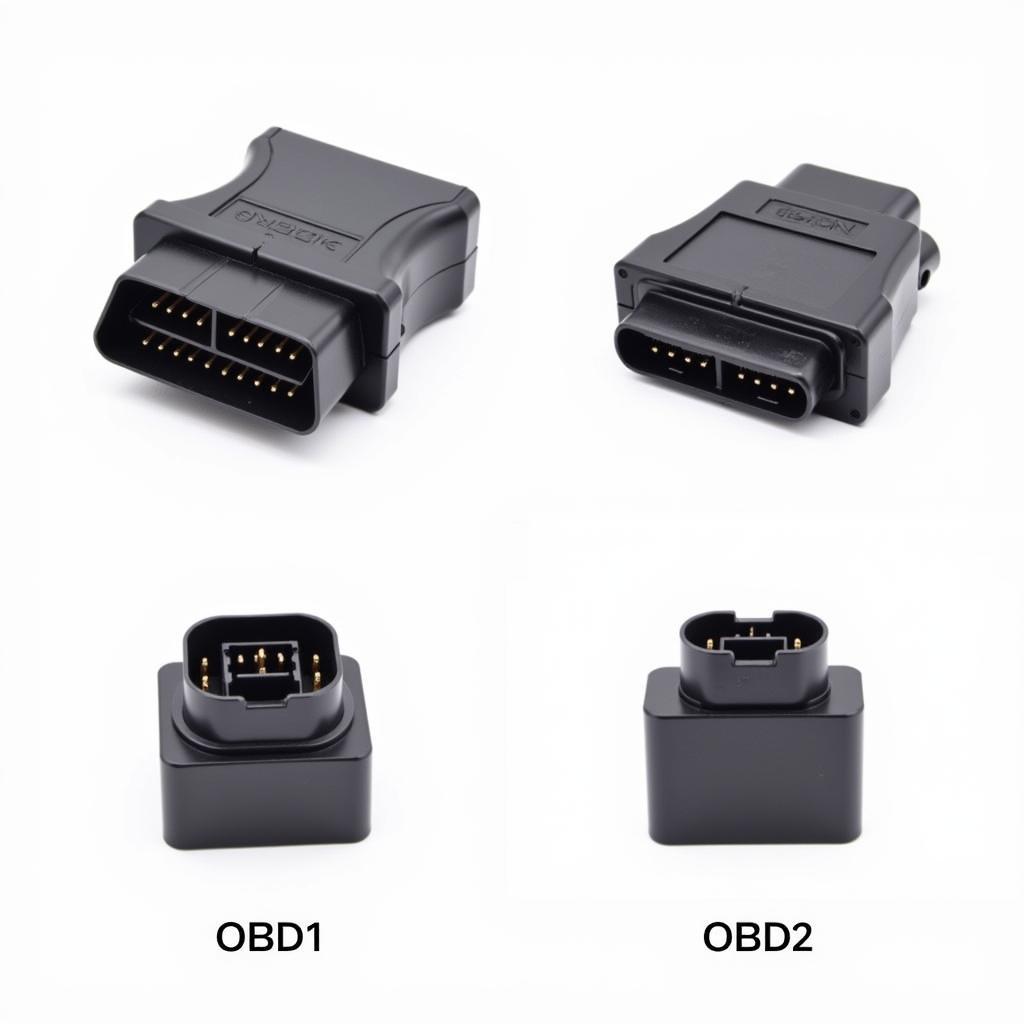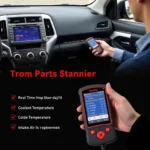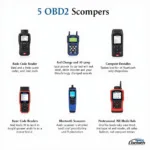If you’re driving an older Honda Civic (pre-1996) and experiencing issues with your check engine light or emissions, you might be considering an OBD1 to OBD2 conversion. This guide provides a comprehensive look at the process, benefits, and potential challenges of converting your Honda Civic to the OBD2 system.
Understanding OBD Systems and Why Conversion Might Be Necessary
OBD stands for On-Board Diagnostics. It refers to a vehicle’s self-diagnostic and reporting system. OBD1, prevalent in cars manufactured before 1996, uses a basic system with limited diagnostic capabilities.
In 1996, the OBD2 system was introduced, offering a standardized system for all manufacturers with improved diagnostics, more comprehensive fault codes, and a universal connector.
While OBD1 systems were sufficient in their time, they can pose challenges for modern diagnostics and repairs. Converting your older Honda Civic to OBD2 can offer several benefits:
- Improved Diagnostics: OBD2 offers more detailed fault codes, making it easier to pinpoint the root cause of issues.
- Easier Repairs: Mechanics can more effectively diagnose and repair your car with the standardized OBD2 system.
- Emissions Testing Compliance: Many states require OBD2 compliance for emissions testing, especially for vehicles manufactured after 1995.
When is an OBD1 to OBD2 Conversion for a Honda Civic Necessary?
Several situations might necessitate an OBD1 to OBD2 conversion for your Honda Civic:
- Persistent Check Engine Light: If your check engine light remains illuminated despite addressing basic issues, an OBD2 conversion can help isolate the problem.
- Emissions Test Failure: In states requiring OBD2 compliance, converting your older Honda Civic might be necessary to pass emissions tests.
- Engine Swap: Swapping an older engine with a newer, OBD2-compliant engine typically requires a conversion for compatibility.
The Conversion Process: What Does it Involve?
Converting your Honda Civic from OBD1 to OBD2 is not as simple as plugging in a new connector. It’s a multi-step process that typically involves:
-
Gathering Necessary Components:
- OBD2 Engine Control Unit (ECU): The ECU is the brain of your car’s engine management system. You’ll need an OBD2-compatible ECU for your specific Honda Civic model.
- OBD2 Wiring Harness: The wiring harness connects the ECU to the various sensors and components in your engine bay.
- OBD2 Oxygen Sensors: You’ll likely need to replace your existing oxygen sensors with OBD2-compatible ones.
- OBD2 Diagnostic Port: This port allows you to connect a code reader or scanner to access diagnostic information.
-
Wiring and Installation: This step is best left to experienced mechanics, as it involves intricate wiring modifications. The new ECU, wiring harness, sensors, and diagnostic port need to be correctly installed and connected.
-
ECU Programming: The new ECU needs to be programmed with the correct parameters for your specific Honda Civic model. This step ensures the ECU communicates correctly with your car’s systems.
Costs and Considerations
The cost of an OBD1 to OBD2 conversion can vary significantly depending on factors like your Honda Civic model, labor costs in your area, and whether you opt for new or used parts. On average, you can expect to spend between $500 and $1500 for the entire conversion process.
“When considering an OBD1 to OBD2 conversion, it’s crucial to weigh the cost against the benefits,” advises Jake Carter, a certified automotive technician with over 15 years of experience. “For vehicles experiencing persistent issues or facing emissions test failures, the conversion can be a worthwhile investment.”
DIY vs. Professional Installation
While some aspects of the conversion might seem manageable for DIY enthusiasts, it’s generally recommended to have the process handled by experienced mechanics specializing in Honda vehicles.
Incorrect wiring or ECU programming can lead to significant engine problems and costly repairs.
Conclusion
Converting your OBD1 Honda Civic to OBD2 can be a beneficial upgrade, offering improved diagnostics, easier repairs, and emissions test compliance. While it’s not a simple plug-and-play process, the advantages often outweigh the costs, especially for owners of older Honda Civics experiencing persistent engine issues or facing stringent emissions regulations. If you’re considering this conversion, consult with a trusted mechanic specializing in Honda vehicles to discuss your specific needs and explore the best course of action for your car.
FAQs About OBD1 to OBD2 Conversion for Honda Civic
1. Will converting to OBD2 improve my Honda Civic’s performance?
The primary purpose of the conversion is to enhance diagnostics and emissions control. While you might notice a slight improvement in engine performance due to more precise fuel mapping and timing, don’t expect a significant horsepower boost.
2. Can I perform the OBD1 to OBD2 conversion myself?
It’s highly recommended to have the conversion done by experienced mechanics specializing in Honda vehicles. The process involves intricate wiring, ECU programming, and potential compatibility issues best handled by professionals.
3. Is it legal to convert my OBD1 Honda Civic to OBD2?
Yes, it’s generally legal as long as the conversion meets your state’s emissions regulations. However, it’s crucial to check with your local Department of Motor Vehicles (DMV) to ensure compliance.
4. What should I do if my check engine light stays on after the conversion?
A check engine light after conversion could indicate an issue with the installation or ECU programming. It’s essential to have a qualified mechanic diagnose and address the problem.
5. Where can I find reliable parts for the conversion?
You can source parts from reputable suppliers, salvage yards specializing in Honda vehicles, or authorized Honda dealerships. Ensure the parts are compatible with your specific Honda Civic model and year.
Related Resources on OBDFree
For further information on OBD2 scanners and related topics, check out these helpful resources:
We encourage you to explore our website for more insightful articles and reviews on OBD2 scanners, diagnostic tools, and car maintenance tips.
Need Assistance? Contact Us Today!
If you have any further questions about OBD1 to OBD2 conversions or require expert advice on diagnostic tools for your Honda Civic, don’t hesitate to contact our team via WhatsApp at +1(641)206-8880 or email us at [email protected]. Our dedicated customer support team is available 24/7 to assist you.


